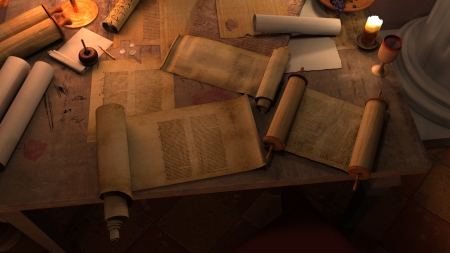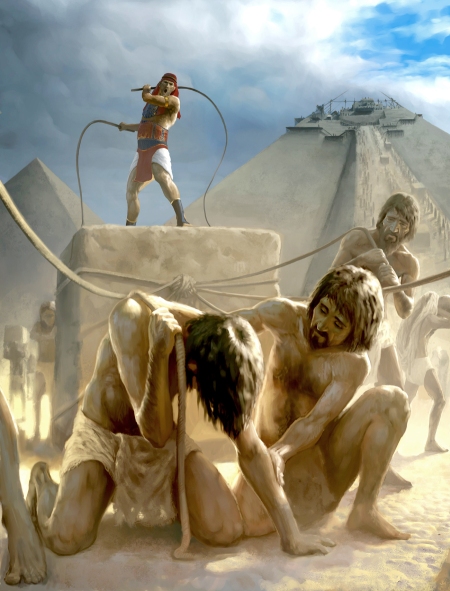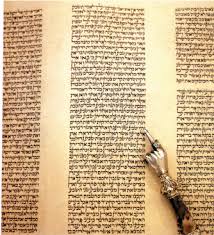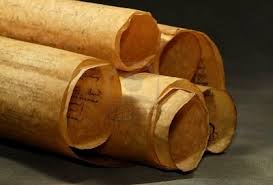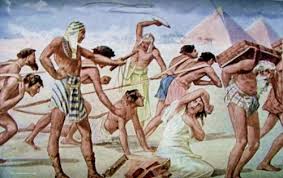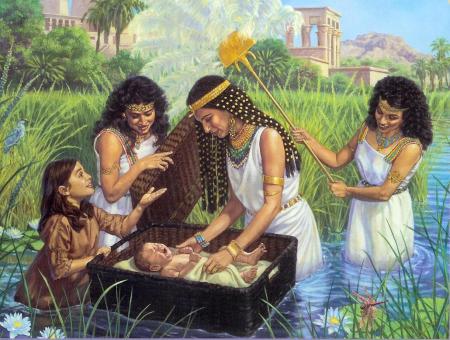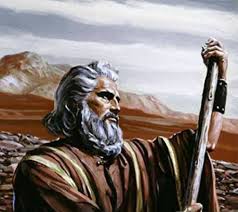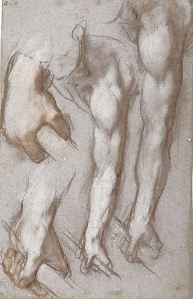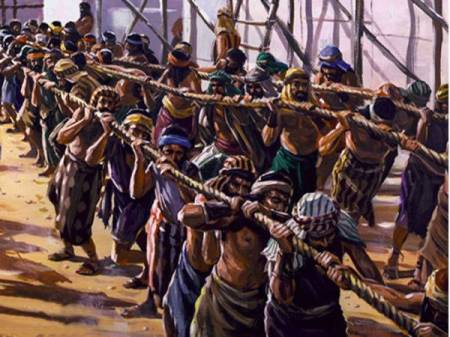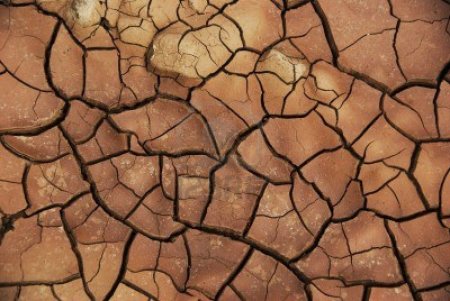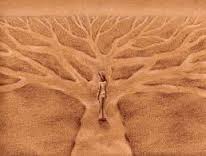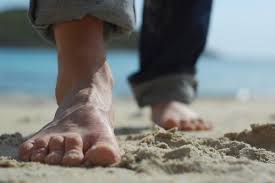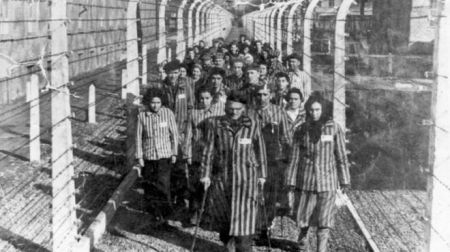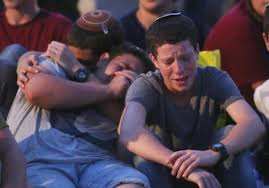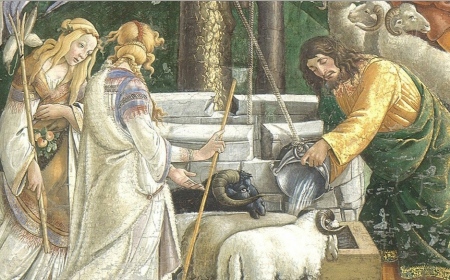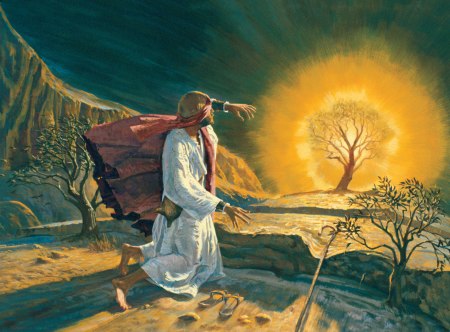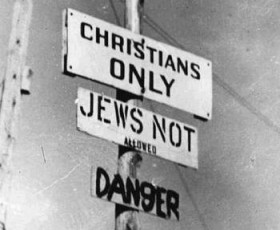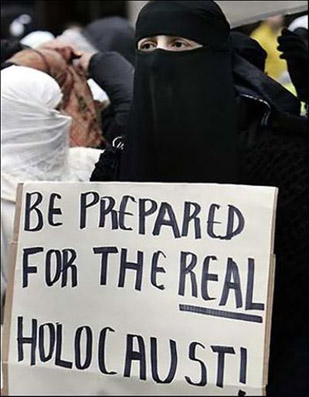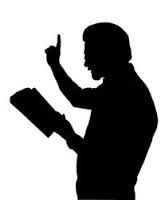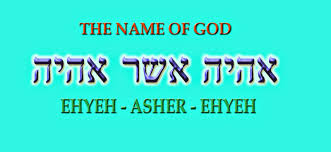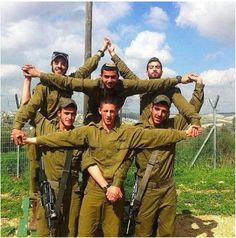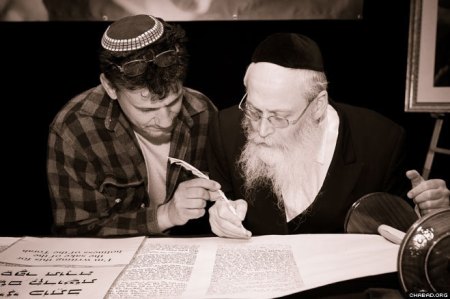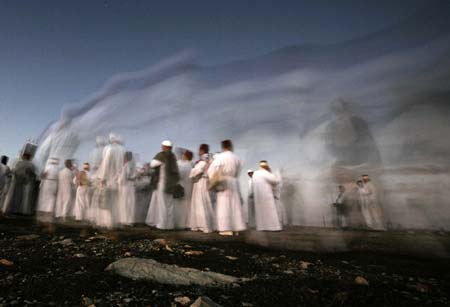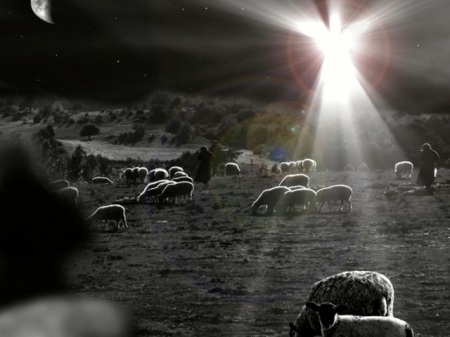Shemot and the Psalm of Remembrance
This week’s Torah reading takes us into the second Sefer, Book, of the bible. Last week we were finishing Bereshit, the Beginning…and ended our months of illumination with the words “Chazak, chazak, v’nitchazek!” = Be strong, be strong and may we be strengthened! With the Torah’s richness and complexity it is a challenge for one to make any statement wherein one stroke in the canvas is greater or more meaningful than then next, for each stroke comes together to make the masterpiece. The same can be said for scripture as a whole. In seeking out a word study for this portion entitled Shemot, the Names (which is the Name for the Book of Exodus in the Hebrew) I believe HASHEM led me to Psalm 38.
There was one theme which drew me to it: suffering. The Torah portion of Shemot begins with the enslavement and torment of the Hebrews in Egypt under a wicked king who chose to keep no covenant loyalty to the descendants of the man who had been salvation to all of Egypt years before (Yosef). It says the new Pharaoh didn’t know of Joseph in some translations, but the word Yada-to know, has the connotation of covenant allegiance. With likenesses and tributes to Joseph throughout the land there is little chance that, even with the passing of time, what he did for Egypt could not have been familiar. Pharaoh chose not to recognize, Pharaoh chose not to remember.
So in going through this portion it is no coincidence that I was led to the Psalm of Remembrance. David pours out an anguished, crushed, and fragmented lament…wailing to the God Who remembers, for Him to do just that. I found in the 22 verses of Psalm 38, more than 23 common words to the Torah portion Shemot not including Lord or God also common in both…so nearly each verse of our Psalm had come connection simply by vocabulary to our Torah Portion. That astounded me and led me to dig a little deeper and investigate any connections to David’s plight and outcry to that of the Children of Israel, perhaps it will bless you and you will be able to glean some deeper meaning and spiritual application. IF you don’t think you can commit to a long read don’t deprive yourself of what I think are unmistakable ties within these scriptures…skip over my commentary and just read the scripture as you go down, (AT THE BOTTOM ARE THE PSALM AND CONNECTING EXODUS 1-6 TEXTS WITHOUT COMMENTARY SO THE LORD CAN REVEAL TO YOU WHAT HE WILLS WITHOUT MY COMMENTARY OR PHOTOS TO DISTRACT) I think it will bless and amaze you as it has me!
Start out by reading Psalm 38 in full:
Psalm 38; 1 O Lord, rebuke me not in Your wrath, and chasten me not in Your burning anger.
2 For Your arrows have sunk deep into me, and Your hand has pressed down on me.
3 There is no soundness in my flesh because of Your indignation; there is no health in my bones because of my sin.
4 For my iniquities are gone over my head; as a heavy burden they weigh too much for me.
5 My wounds grow foul and fester because of my folly.
6 I am bent over and greatly bowed down; I go mourning all day long.
7 For my loins are filled with burning, and there is no soundness in my flesh.
8 I am benumbed and badly crushed; I groan because of the agitation of my heart.
9 Lord, all my desire is before You; and my sighing is not hidden from You.
10 My heart throbs, my strength fails me; and the light of my eyes, even that has gone from me.
11 My loved ones and my friends stand aloof from my plague; and my kinsmen stand afar off.
12 Those who seek my life lay snares for me; and those who seek to injure me have threatened destruction, and they devise treachery all day long.
13 But I, like a deaf man, do not hear; and I am like a mute man who does not open his mouth.
14 Yes, I am like a man who does not hear, and in whose mouth are no arguments.
15 For I hope in You, O Lord; You will answer, O Lord my God.
16 For I said, “May they not rejoice over me, who, when my foot slips, would magnify themselves against me.”
17 For I am ready to fall, and my sorrow is continually before me.
18 For I confess my iniquity; I am full of anxiety because of my sin.
19 But my enemies are vigorous and strong, and many are those who hate me wrongfully.
20 And those who repay evil for good, They oppose me, because I follow what is good.
21 Do not forsake me, O Lord; O my God, do not be far from me!
22 Make haste to help me, O Lord, my salvation!
Below is a list of the 23 Hebrew words common in both Shemot and Psalm 38 with their meaning:
זכיר Zakar- to mark (so as to be recognized), to remember; by implication, to mention.
יד Yad- a hand (the open one (indicating power, means, direction, etc.)
כבד- Kabed- heavy; figuratively in a good sense (numerous) or in a bad sense (severe, difficult, stupid).
בשר Basar- flesh (from its freshness); by extension, body, person; also (by euphem.) the pudenda of a man.
לב Leb- the heart; also used (figuratively) very widely for the feelings, the will and even the intellect; likewise for the centre of anything.
איש ba’ash – to smell bad; figuratively, to be offensive morally.
הלכ halak – to walk (in a great variety of applications, literally and figuratively)
אנחת anachah – sighing.
חרש cheresh – deaf (whether literally or spir.).
שמע shama – to hear intelligently (often with implication of attention, obedience, etc.; causatively, to tell, etc.)
אלם’ – illem – speechless.
פה peh – the mouth (as the means of blowing), whether literal or figurative (particularly speech); specifically edge, portion or side.
פתח pathach- to open wide (literally or figuratively); specifically, to loosen, begin, plough, carve.
ענה anah aw-naw’- to eye or (generally) to heed, i.e. pay attention; by implication, to respond; by extens. to begin to speak; specifically to sing, shout, testify, announce.
מכאוב mak’ob – from H3510; anguish or (figuratively) affliction.
עצמ atsam – to bind fast, i.e. close (the eyes); intransitively, to be (causatively, make) powerful or numerous; denominatively (from H6106) to crunch the bones.
שנאי sane’ -to hate (personally).
רגל regel – a foot (as used in walking); by implication, a step; by euphem. the pudenda.
עמד `amad – to stand, in various relations (literal and figurative, intransitive and transitive).
בקש baqash – to search out (by any method, specifically in worship or prayer); by implication, to strive after.
עזב azab – to loosen, i.e. relinquish, permit, etc.
רעה ra – bad or (as noun) evil (natural or moral)
שקר sheqer – an untruth; by implication, a sham.
I have documented the Psalm of David broken up with the Exodus text in the order by which the words came down from the Psalm. The Exodus text is found italicized in Bold. ** My thoughts and reflections are between the connecting verses of the Psalm and Torah text.
Psalm 38; 1 A Psalm of David, for a memorial. (ZAKAR)
O Lord, rebuke me not in Your wrath, and chasten me not in Your burning anger.
Exodus 2; 24 God heard their moaning, and God remembered (ZAKAR) his covenant with Abraham, with Isaac, and with Jacob.
**So our Psalm and our Torah portion both begin with the idea of God remembering זכיר Zakar- to mark (so as to be recognized), to remember; by implication, to mention. David is about to lay it all out before his King and in the end ask for His Salvation- Yeshua meanwhile the נאקתם n’aqah – a groaning of the children of Israel reach their King and He recognizes the Covenant He swore to their fathers and prepares to take action for their redemption.
2 For Your arrows have sunk deep into me, and Your hand (YAD) has pressed down on me.
**One can’t help but think on the imagery of crushing slavery, the gigantic stonework breaking the bodies, backs, bones of the people beneath this weight. David recognizes it is the Lord Whose hand is in all things, thus there is nothing outside His charge or control. In His hand יד Yad- a hand (the open one (indicating power, means, direction, etc.) lies the fate of all creation. That being said, look into our Torah portion and realize, step by step…hand over hand each and every person has a role and a choice to make which will effect the course of history, our present and the future events.
Exodus 2;5 The daughter of Pharaoh came down to bathe at the Nile, with her maidens walking alongside (YAD) the Nile; and she saw the basket among the reeds and sent her maid, and she brought it to her.
** Batyah, Pharaoh’s daughter is a princess and royalty in the most powerful kingdom in the known world. It is her father who has given the very order to exterminate all the Hebrew boys living in Egypt. Just as God took notice of the suffering of His people, others in our portion do the very same and it is these instances of stopping the everyday affairs to take active concern which highligh these sections. This Egyptian princess stops while walking down what the Hebrew states is the Yad of the Nile. She see’s the basket which houses the future deliverer of the Hebrews inside and stretches out her hand, yad, to take him in. Moses is brought by the yad of the maidservant and placed into her hands. She too makes the decision to have compassion on the child, defy her fathers orders, and do what is best for this child. When the option to look away drifted into her path…she chose to concern herself with the life of something foreign, something unusual, something unexpected.
Exodus 2; 19 So they said, “An Egyptian delivered us from the hand (YAD) of the shepherds, and what is more, he even drew the water for us and watered the flock.”
**Jethro’s seven daughters return from an unusual experience to report. An Egyptian man has delivered הצילנ natsal- to snatch away, them from a group of shepherds who were threatening them in ways one can only imagine might befall unattended women…this foreigner went further and concerned himself with the care of their flocks. Moshe had only recently fled from the rejection of his own people. Having ventured out of the palace to involve himself in the circumstances of his brethren (a gesture he didn’t have to make) he took note of one of his brethren being afflicted by the overly heavy yad of a taskmaster and Moshe killed the Egyptian and buried, with his yad, him in the sand. The next day as he saw his brethren fighting among themselves, raising their yad against one another… he questions the man in the wrong, the man responds with “Who made you ruler and judge over us? Will you kill me like you killed that Egyptian?” Moshe is terrified and realizes that not only he and God are aware of the matter. This is where we find him, a fugitive and a stranger…he makes huge efforts to save these women and serve them. Certainly this was something they considered unexpected.
Exodus 3; 8 So I have come down to deliver them from the power (YAD) of the Egyptians, and to bring them up from that land to a good and spacious land, to a land flowing with milk and honey, to the place of the Canaanite and the Hittite and the Amorite and the Perizzite and the Hivite and the Jebusite.
Exodus 3; 19 But I know that the king of Egypt will not permit you to go, except under compulsion (a mighty YAD). 20 So I will stretch out My hand (YAD) and strike Egypt with all My miracles which I shall do in the midst of it; and after that he will let you go.
Exodus 4;1 Then Moses said, “What if they will not believe me or listen (SHAMA) to what I say? For they may say, ‘The Lord has not appeared to you.’” 2 The Lord said to him, “What is that in your hand (YAD)?” And he said, “A staff.”
**God has heard His people cry, He has seen their affliction and now He has come down ואר yarad – to descend (literally, to go downwards; or conventionally to a lower region, as the shore, a boundary, the enemy, etc.; or figuratively, to fall); causatively, to bring down. What has He come down to do? To rescue הצילנ natsal- snatch away His people from the cruel hand- Yad- of Pharaoh, to bring them with His loving Yad to the promised Land. God says in Exodus 3;19 He knows that despite each warning and ensuing plague, in defiance of all the wonders and miracles God will bring about by His Yad over Egypt…Pharaoh when given free will to choose, will opt for his ego at the cost of his people, his land, his honor and the life of his very own son…rather than choose to release the Hebrews from his stubborn yet fragile grip. The NASB translation says “under compulsion”, the Hebrew relates.. with a mighty hand, a Yad which is חזק chazaq- strong ( in a bad sense, hard, bold, violent) El Elyon…the Most High God will strike Pharaoh within him at his קרב qereb – nearest part, i.e. the center. Only then will the Hebrews be sent away. God is actively going to intersect with humanity by means of a messenger, Moshe, and in his Yad will be the instrument which God has chosen to display His wonders…a staff. Similarly it is Moshe’s leprous Yad which will convince the elders of the people to believe that something ‘big’ has begun and that they too can have a future and a life beyond this bondage…hope on their hands, and in their nearest part.
Exodus 4;6 The Lord furthermore said to him, “Now put your hand (YAD) into your bosom.” So he put his hand (YAD) into his bosom, and when he took it out, behold, his hand was leprous like snow.
Exodus 4; 13 But he said, “Please, Lord, now send the by (the YAD of) whomever You will.”
Exodus 4; 17 You shall take in your hand (YAD) this staff, with which you shall perform the signs.”
3 There is no soundness in my flesh (BASAR) because of Your indignation; there is no health in my bones because of my sin.
Exodus 4; 7 Then He said, “Put your hand (YAD) into your bosom again.” So he put his hand (YAD)into his bosom again, and when he took it out of his bosom, behold, it was restored like the rest of his flesh (BASAR).
** David says that his בשר Basar- flesh (from its freshness); by extension, body, person…is without wholesomeness in the face of his sin, there is no שלום shalom- safe, i.e. (figuratively) well, happy, friendly; also (abstractly) welfare, i.e. health, prosperity, peace…in his bones in the face of the indignation- זעמ za`am -strictly froth at the mouth, i.e. (figuratively) fury (especially of God’s displeasure with sin)…of HASHEM. The word basar can give the sense of a whole person, a body, a life…certainly this single verse calls to mind the many elements which make up a man…flesh, the face, health, bones, and the mouth. I wonder how the people in Egypt might have felt they had sinned, in their transgression had God become indignant unto their plight? Moshe’s sign, the leprous hand…leprosy being like unto death, transformed into flesh, basar…life restored! שבה shuwb- to turn back (hence, away) transitively or intransitively, literally or figuratively (not necessarily with the idea of return to the starting point). This is what the dead flesh has done, it has returned…Shuwb is the root of the Hebrew word for Teshuvah…which means repentance. For healing and relief, for freedom, deliverance and redemption one must return to HASHEM and become a repentant servant aware of the frailty of the flesh and reliant upon the one willing to bring you back to life!
4 For my iniquities are gone over my head; as a heavy (KABED, KABED) burden they weigh too much for me.
Exodus 5; 9 Let the labor be heavier (KABED) on the men, and let them work at it so that they will pay no attention to false words.(SHEQER) ”
*David speaks of iniquity עונ avon – perversity, i.e. (moral) evil, which is so high it has surmounted his head…burdens so excessive כבד- Kabed- heavy; severe, difficult, stupid. that they are heavy…too heavy for him to carry. Are these his own evils, that of his kingdom, those of his enemies all around him, are these the snares of the evil one always lurking after God’s people? Certainly we can see the connection to the weight of David’s sense of drowning in immorality…and the Hebrews laboring and lamenting under the heavy burden of bricks and mortar. Pharaoh says: let their load be even heavier so that they forget all about worshiping HASHEM. Make them drown in the sorrow and pain and physical torment so much that the weight of it all makes it impossible to serve anyone or anything aside from Egypt and its king. This is what we are God’s people should strive to do, continue to trudge through the immorality all around us and find a way to seek God and worship him despite our burdens.
5 My wounds grow foul (BA’ASH) and fester because of my folly.
Exodus 5; 21 They said to them, “May the Lord look upon you and judge you, for you have made us odious (BA’ASH) in Pharaoh’s sight and in the sight of his servants, to put a sword in their hand to kill us.”
-David speaks of wounds- חבורת chabbuwrah- bound (with stripes), i.e. a weal (or black-and-blue mark itself), can you not picture the slave bound so tightly his skin is broken and bruised? These wounds are left unattended to. There is no master to care for them, to smooth them with oil. I can just sense the feeling of abandonment the Hebrews must have felt. These wounds are becoming infected and foul smelling- איש ba’ash – to smell bad; figuratively, to be offensive morally. This is the scent that the people describe to Moshe and Aaron, saying they have become a loathsome and putrid, detestable odor to the Egyptians and they are afflicting them even more. The revelation of the God of their fathers to these Shepherds did not appear to begin as a gift unto them. Back in Yosef’s day, it was the scent of sheep on a shepherd that was detestable…for the sheep was Egypt’s false god. The very idea of tending to and eating such animals was atrocious to the pagan mind which worships the creation rather than its Creator. Therefore Joseph sat his brothers apart from the Egyptians. [Genesis 43; 32 So they served him by himself, and them by themselves, and the Egyptians who ate with him by themselves, because the Egyptians could not eat bread with the Hebrews, for that is loathsome (תועבה tow`ebah – something disgusting (morally), i.e. (as noun) an abhorrence; especially idolatry or (concretely) an idol.) to the Egyptians.] So what is it about the Hebrews request which is the festering repulsive scent to Pharaoh? The idea that his slaves have something to live for, something to keep them going, a God Who takes note of them, a true King who they long to worship and offer unto. If Pharaoh were to let them go, even for a three day period…he knows this would be like that oil smoothed over their wounds by their loving Master and it would be detrimental to his abuse humiliation and exploitation of the Hebrews because it would give them a reason to live. It would give them hope something he will do everything in his power to quelch.
6 I am bent over and greatly bowed down; I go (HALAK) mourning all day long.
** Halak, simply can mean to GO. It can mean to WALK. Each and every day we halak, the question is…how do we walk? With what purpose, goal, intention do we approach each and every task set before us? Do we realize with each step and course and mode with which we take action in our lives…how far reaching each and every step’s ramifications can become…for years to come? Generations to come? David is walking, going…in a state of sorrow, mourning, darkness קדר qadar kaw-dar’- to be ashy, i.e. dark-colored; by implication, to mourn (in sackcloth or sordid garments). This term qadar is used in the sense of mourning and darkness as I said but its not just any darkness…this is the darkness found at the great and terrible “day of the Lord”. I found it fascinating when following this track of where the word Halak was found in the Torah portion that each one…led us through the main and important highlights of the entire account.
There were too many instances of HALAK-to walk, to list here but let’s take a ‘stroll’ through them in short: 1) A man of Levi Halak and takes a woman from Levi= Moshe’s parents meet and marry. 2) Pharaoh’s daughter Halak by the River Nile where she notice’s Moshe’s ark in the reeds. 3) Miriam is Halak after the little refuge housing her baby brother to see what will become of him, 4) then she offers to Halak and find a nurse (her own mother) for the child. 5) Pharaoh’s daughter agrees and commands Yocheved to Halak the child and nurse him and care for him on her behalf. 6) God says to Moses, go Halak! I am sending you to Pharaoh. 7) Moshe responds, “Who am I to Halak to Pharaoh?” 8) God says to Moshe, go! Halak! Gather the elders of the people and tell them the God of their Fathers has sent me to you. 9) Tell Pharaoh we will Halak, a three day’s journey into the desert to worship our God, 10)Pharaoh will not let you Halak. 10) But I will Halak you out of Egypt and 11) when you Halak you will not Halak empty handed. 12) God says to Moses, Halak! And I will become your mouth and direct you how to speak. 13) Moses Halak back to Jethro and tells him 14) he wishes to please Halak to his brothers who are in Egypt. 15) Jethro responds, “Halak in peace”. 16) God comes to Moshe in Midan and says for him to Halak back to Egypt for all the men who wanted to kill him have died, 17) He says to Halak and see all the wonders God will perform there. 18) God comes to Aaron and tells him to Halak to his brother Moshe, 19) Aaron does Halak as God instructed. 20) Moshe and Aaron Halak to the elders and speak to them all the words of God and perform the signs He instructed them, and they believe. 20) Moshe, Aaron and the elders go to Pharaoh and ask if they may Halak for the three day journey into the wilderness to worship HASHEM. 21) Pharaoh responds, “Go Halak to your burdens.” 22) The pharaoh commands the people to go Halak themselves and get their own straw to fill the prescribed quota of bricks. 23) Halak, go! Get your own straw. 24) You said you wanted to go Halak and worship your God, 25) go Halak! and gather your own straw and fill the same number of bricks. -Exodus 2;1- 5;18
7 For my loins are filled with burning, and there is no soundness in my flesh (BASAR).
Exodus 4;7 Then He said, “Put your hand into your bosom again.” So he put his hand into his bosom again, and when he took it out of his bosom, behold, it was restored like the rest of his flesh (BASAR).
8 I am benumbed and badly crushed; I groan because of the agitation of my heart (LEB).
**David says, I am sluggish, wholly crushed… דכית dakah daw-kaw’- to collapse (phys. or mentally). There is a rumbling because of the snarl in the leb, heart of me. This is what the Hebrew expresses. Like a wild animal inside the heart…roaring, snarling…where is the man? The man is totally ruined. Is it a coincidence that the first of the Nazi concentration camps was named Dachau (pronounced strikingly similarly to the Hebrew word Dakah)? Prisoners living in Dachau were in constant fear of brutal treatment and terror detention including standing cells (a special cell constructed so as to prevent the prisoner from doing anything but standing), floggings, the so-called tree or pole hangings ( a form of torture in which the victim’s hands are first tied behind his or her back and suspended in the air by means of a rope attached to wrists, which most likely dislocates both arms. Weights may be added to the body to intensify the effect and increase the pain.), and standing at attention for extremely long periods. There were 32,000 documented deaths at the camp, and thousands that are undocumented. David can relate to the pain of his forefather’s and the slavery which caused many a total mental and physical collapse…a collapse of mind, body, spirit….of Leb, of the heart. Their suffering in Egypt is unfortunately a precursor to the antisemitism that would follow the Jewish people throughout the ages and sadly…still remains today. What else still remains today is the heart of a people to continue to pursue life, light, Torah, service of HaShem and the healing of the world, Tikun Owlam. It is God’s heart for His people which has enabled them to endure and rise above the torment.
Exodus 4; 14 Then the anger of the Lord burned against Moses, and He said, “Is there not your brother Aaron the Levite? I know that he speaks fluently. And moreover, behold, he is coming out to meet you; when he sees you, he will be glad in his heart (LEB).
Exodus 4; 21 The Lord said to Moses, “When you go back to Egypt see that you perform before Pharaoh all the wonders which I have put in your power; but I will harden his heart (LEB) so that he will not let the people go.
**Aaron and Moshe are to work together as brothers, furthermore the elders of the Hebrews will go along with them when they confront Pharaoh and make their requests. God tells Moshe, after an extensive conversation with him, after much self-doubt and a sort of rumination on the part of Moshe…God expresses that his brother is coming to him with gladness in his heart. It’s almost as if God is saying…See Aaron is more than happy to do this task already! When they do arrive and come to Pharaoh and even though they will warn him and engage in a sort of contrasting diplomatic showdown…in the end it is God’s work in Pharaoh’s heart which will allow everything to come about the way that it does. Free will? How can it be free will in Pharaoh if God is “doing something” to his heart? Pharaoh is not a puppet being manipulated, God knows what is inside Pharaoh’s heart and gives him the chance to repent and embrace the fact that there is might beyond man…beyond the idols of man…beyond the king of Egypt who thinks he is god.
9 Lord, all my desire is before You; and my sighing (ANACHAH) is not hidden from You.
** David says, Lord…my longing -תאות ta’avah -a longing; by implication, a delight…is opposite You, a counterpart, partner…You know it well. He says, his sighing is not hidden cathar-to hide (by covering) and he himself has not covered it.The children of Israel are sighing as well, because of their labor… and they cry- זעק za`aq- to shriek (from anguish or danger); by analogy, (as a herald) to announce or convene publicly. It is not hidden, as their shrieks of anguish have risen, God has descended to attend to their longing.
אנח anach – to sigh. Exodus 2; 23 Now it came about in the course of those many days that the king of Egypt died. And the sons of Israel sighed (ANACH) because of the bondage, and they cried out; and their cry for help because of their bondage rose up to God.
10 My heart (LEB) throbs, my strength fails me; and the light of my eyes, even that has gone (AZAB) from me.
**What a list! The heart is still beating, its palpitating…his vigor, relinquished…the light (happiness) of his eyes…there is none within him. Consider Moshe, a former prince, ruler, leader, general, royal [ Sefer Yasher 70; 40 And Moses was in the king’s house going out and coming in, the Lord gave him favor in the eyes of Pharaoh, and in the eyes of all his servants, and in the eyes of all the people of Egypt, and they loved Moses exceedingly.50 And the Lord was with Moses and his fame went throughout Egypt. 51 And Moses became great in the eyes of all the Egyptians, and in the eyes of all the children of Israel, seeking good for his people Israel and speaking words of peace regarding them to the king.]…now, a fugitive, a wanderer a man without a home, without a name, without a legacy yet with many weighty troubles. How must he have felt? What could have been going through his mind? We mentioned how Moshe became a hero to the seven daughters of Jethro, delivering them from the bad shepherds and watering their flocks. Now it’s Jethro’s turn to concern himself with an unusual situation involving a foreigner. He exclaims to his daughters…why have you left your savior at arms length? why have you left him afar off? why have you- עזב azab – to loosen, i.e. relinquish, permit, etc.? At this moment, had this man… who would bring the stranger into his home and give him a daughter allowing him sonship…had this surrogate father to Moshe left him behind there would have been a whole different story, a different course and mode to bring about the growth and nurturing of ‘future deliverer’. Jethro took an interest, he took action and sent for Moshe to come near. Near he came, in the many years pasturing Jethro’s flocks Moshe learned to listen, to hear and to pay attention…after the years of the blinding blaze and raucous clamor of palace life, city life…he finds himself in the desert and he finds something more: The light…the intrigue of a miraculous flame…the voice of the Lord and a mission.
Exodus 2; 19 So they said, “An Egyptian delivered us from the hand of the shepherds, and what is more, he even drew the water for us and watered the flock.” 20 He said to his daughters, “Where is he then? Why is it that you have left (AZAB) the man behind? Invite him to have something to eat.”
11 My loved ones and my friends stand (AMAD) aloof from my plague; and my kinsmen stand (AMAD) afar off.
Exodus 3; 5 Then He said, “Do not come near here; remove your sandals from your feet, for the place on which you are standing (AMAD) is holy ground.”
**So many stand by when the Jewish people are persecuted. Neighbors, friends, partners in business…all these bonds wither and fray when oppression sets in. Perhaps loyalty to the tyrannized would infect ones own prosperity, perhaps one might have to be clamped in chains alongside said associate…this is something many are unwilling to even consider. David calls out three groups of people in his life, those who love him…those who are associates….and those who are near, his kin. Those with ahav-love, and his associates stand opposite his plague…his kin are in a remote place. Remember how crushed he is professing to be, how broken…one can hardly imagine him standing. Yet this is what all those in his life seem to do, they stand -עמד `amad and what do they see? PLAGUE! Our connection to Exodus and perhaps even to the burning bush experience, for what is it that Moshe’s hand is afflicted with? The Hebrew word for plague here is נגע nega` – a blow (figuratively, infliction); also (by implication) a spot (concretely, a leprous person or dress). Interestingly it is God in the burning bush passage Who asks Moshe to become aware of where he is standing, God asks him not to come too near.
12 Those who seek (BAQASH) my life lay snares for me; and those who seek to injure me (inquiring of RA) have threatened destruction, and they devise treachery all day long.
**David has gone over the beings in his life: friends, family, associates how they stand and witness his pain but do not come too close. Now he continues to those who seek his life, who set a snare- נקש naqash -to entrap (with a noose), literally or figuratively, those who search for evil to arrange his fall and ruin, deceiving and defrauding with their murmurings all day long. בקש baqash – to search out (by any method, specifically in worship or prayer); by implication, to strive after. In our portion there is an adversary after Moshe, seeking and striving after his death. Once this threat has passed God assures Moshe those who sought and strove to kill him were themselves dead. Why did God have to tell Moshe to go down to Egypt? Hadn’t that been established…after the litany of questions and ‘oppositions’ Moshe gave God in the end it seemed assured, but God has to tell him again. If there is one section of Torah which alludes me (surely there are many) I have more unanswered questions about Exodus 4; 24-26 perhaps than anywhere else. God himself Baqash Moshe. What can we learn from this? Even the greatest of Tzaddikim, righteous ones…even this one who spoke face to face with God Almighty…whatever title, whatever position, however great your service has been…when we cross the Lord, transgressing His eternal commands and evading our set tasks…there is danger or retribution and just judgment. [ Ezekiel 33; 11 Turn back, turn back from your evil ways! Why then will you die, O house of Israel?’ 12 And you, son of man, say to your fellow citizens, ‘The righteousness of a righteous man will not deliver him in the day of his transgression, and as for the wickedness of the wicked, he will not stumble because of it in the day when he turns from his wickedness; whereas a righteous man will not be able to live by his righteousness on the day when he commits sin.’] The war against sin is daily, its an ongoing process to strive to live for the Lord and walk in His ways. Perfection will never come until this flesh is changed, imperishable. [ I John3;4 Whosoever committeth sin transgresseth also the law: for sin is the transgression of the law.]
Exodus 2; 15 When Pharaoh heard of this matter, he tried (BAQASH) to kill Moses. But Moses fled from the presence of Pharaoh and settled in the land of Midian, and he sat down by a well.
Exodus 4;19 Now the Lord said to Moses in Midian, “Go back to Egypt, for all the men who were seeking (BAQASH) your life are dead.”
Exodus 4; 24 Now it came about at the lodging place on the way that the Lord met him and sought (BAQASH) to put him to death.
13 But I, like a deaf (CHERESH) man, do not hear (SHAMA); and I am like a mute (IVVER) man who does not open his mouth (PEH).
Exodus 4;11 The Lord said to him, “Who has made man’s mouth (PEH)? Or who makes him mute (CHERESH) or deaf (IVVER), or seeing or blind? Is it not I, the Lord?
**Just look at that! David says he is deaf and unable to hear, mute and unable to open his mouth. Perhaps in his own way he is calling out to the Lord for the very encouragement given to Moshe when he doubted his mouth? Yes I said encouragement, not chastisement. Why? Because sometimes we forget to see ourselves (and one another) the way God see’s us. Moshe goes through a number of questions for the Lord and with each response we learn something more about God’s mission for him and how He will carry it out, bring it about. This idea of Moshe finally answering with “I can’t” is what causes the Lord to flare up! Sometimes He needs to snap us out of it, so to speak, to get our attention but to me this is not a punishment in any way…its enlightening in a darkened place to remember that God is the One Who has not only put us right where He needs us to be but also has made us who we are, and is continuing to work on us and within us.
14 Yes, I am like a man who does not hear (SHAMA), and in whose mouth (PEH) are no arguments.
**Again, that is amazing to me. The opposite of Moshe, David says he is like a man who does not hear- שמע shama – to hear intelligently (often with implication of attention, obedience, etc.; causatively, to tell, etc.) and has no argument in his mouth. While Moshe isn’t really arguing with God in a defensive sense he certainly did have reasonable objections which he voiced. Moshe did hear with the intention of obedience throughout his life, this is one reason that God loved him.
Exodus 2;15 When Pharaoh heard (SHAMA) of this matter, he tried to kill Moses. But Moses fled from the presence of Pharaoh and settled in the land of Midian, and he sat down by a well.
Exodus 2;24 So God heard (SHAMA) their groaning; and God remembered His covenant with Abraham, Isaac, and Jacob.
Exodus 3;7 The Lord said, “I have surely seen the affliction of My people who are in Egypt, and have given heed (SHAMA) to their cry because of their taskmasters, for I am aware of their sufferings.
Exodus 3;18 They will pay heed (SHAMA) to what you say; and you with the elders of Israel will come to the king of Egypt and you will say to him, ‘The Lord, the God of the Hebrews, has met with us. So now, please, let us go a three days’ journey into the wilderness, that we may sacrifice to the Lord our God.’
Exodus 4; 10 Then Moses said to the Lord, “Please, Lord, I have never been eloquent, neither recently nor in time past, nor since You have spoken to Your servant; for I am slow of speech (PEH) and low of tongue.” 11 The Lord said to him, “Who has made man’s mouth? Or who makes him mute or deaf, or seeing or blind? Is it not I, the Lord? 12 Now then go, and I, even I, will be with your mouth (PEH), and teach you what you are to say.”
Exodus 4;15 You are to speak to him and put the words in his mouth (PEH); and I, even I, will be with your mouth (PEH) and his mouth (PEH), and I will teach you what you are to do. 16 Moreover, he shall speak for you to the people; and he will be as a mouth (PEH) for you and you will be as God to him.
**One of my favorite verses, God expresses…Yes I, Most High, Master of the Universe…even I am taking interest in the plight of my people, I have heard and I am responding. Now its time for you to do the same. Even I will be with your mouth, I will teach you what to say, I will inspire you, I will be with your mouth and teach you what to do. Don’t you know this is what God still does in the lives of those of us who are willing to ‘go there’ for Him. If the words we speak are truly inspired by God, imbued with the Holy Spirit…they can not go forth without effect. They will not be expressed in vain, they will not return empty. If what we are striving to teach and to share and to profess is from the Lord then the Lord’s work will be done through our mouth, peh…and our willingness to Shama- listen with intent on obedience. No doubt.
15 For I hope in You, O Lord; You will answer (ANAH), O Lord my God.
Exodus 4;1 Then Moses said (answered, ANAH), “What if they will not believe me or listen to what I say? For they may say, ‘The Lord has not appeared to you.’”
**Despite all of the pain David is expressing, he is bringing it to the appropriate place…to the One Who Is, Who Was, Who Will Be. God has answered His people in the past, He continues to answer- ענה anah aw-naw’- to eye or (generally) to heed, i.e. pay attention; by implication, to respond…today and in the times ahead which may continue to prove heavy and crushing…He will continue to pay attention and respond to all Who call upon His Name sincerely. David’s hope is in HaShem, he confidently reassures himself and declares..HaShem will answer, his God who hears and responds.
16 For I said, “May they not rejoice over me, who, when my foot (REGEL) slips, would magnify themselves against me.”
** רגל regel – a foot (as used in walking); by implication, a step; by euphem. the pudenda. IF David’s Pslam of remembrance is calling to our remind the Torah section of Shemot, if there is some connection here then could it be coincidental that within the two verse’s where this common word regel, with a meaning as a euphemism has to do with the male reproductive organ…we find regel used in the section of Zipporah circumcising Moshe’s son and touching his foreskin to his feet. So how in the world could this connect thematically? David says may it not be that ‘they’ (maybe the groups of beings connected to him we have aforementioned, perhaps the deceptive trappers seeking his fall, or both) become blithe at the slip-מוט mowt – to waver; by implication , to slip, shake, fall….of David’s regel. That ‘they’ would then tower, lift, magnify themselves over him. IF part of the problem in Exodus 4; 24-26 is that Moshe had a lapse in judgment by not circumcising his son (though I can’t claim to understand what the complexities of the questions these texts bring down I will say the connection to Brit Milah- Circumcision is unmistakable.)…that could be defined as a slip in step. One that an enemy could take occasion to readily accuse Moshe of being the wrong man for the job. Maybe Zipporah recognizes that the regalim, feet..which had only of late been ordained to touch Holy Ground were now stepping aside from fulfilling an important command of HaShem… the sign of the covenant, she must have at least known of Genesis 17;14 “Any uncircumcised male, who has not been circumcised in the flesh, will be cut off from his people; he has broken my covenant.” What she did preserved the life of Moshe, so that he could continue on his mission. [Sefer Yasher 79; 7 And Moses hearkened to all that the Lord had commanded him, and he returned to his father-in-law and told him the thing, and Reuel said to him, Go in peace. 8 And Moses rose up to go to Egypt, and he took his wife and sons with him, and he was at an inn in the road, and an angel of God came down, and sought an occasion against him. 9 And he wished to kill him on account of his first born son, because he had not circumcised him, and had transgressed the covenant which the Lord had made with Abraham. 10 For Moses had hearkened to the words of his father-in-law which he had spoken to him, not to circumcise his first born son, therefore he circumcised him not. 11 And Zipporah saw the angel of the Lord seeking an occasion against Moses, and she knew that this thing was owing to his not having circumcised her son Gershom. 12 And Zipporah hastened and took of the sharp rock stones that were there, and she circumcised her son, and delivered her husband and her son from the hand of the angel of the Lord.]
Exodus 3; 5 Then He said, “Do not come near here; remove your sandals from your feet (REGEL), for the place on which you are standing is holy ground.”
Exodus 4; 25 Then Zipporah took a flint and cut off her son’s foreskin and threw it at Moses’ feet (REGEL), and she said, “You are indeed a bridegroom of blood to me.”
17 For I am ready to fall, and my sorrow (MAK’OB) is continually before me.
Exodus 3; 7 The Lord said, “I have surely seen the affliction of My people who are in Egypt, and have given heed to their cry because of their taskmasters, for I am aware of their sufferings (MAK’OB).
**David just finished saying, WHEN I slip…he is identifying the fact that even a king, even a tzaddik can slip and stumble and fall. This is something he is prepared for because it already established. A King, whose sorrow- מכאוב mak’ob – anguish or (figuratively) affliction is continually before Him. Our King see’s the affliction of His people, their anguish, their shrieks of pain, the crushing of their bones, their עני oniy -depression, i.e. misery is not foreign, unfamiliar or even unusual to Him. God says he KNOWS Yada- intimately, in covenant terms…their mak’ob. God is not aloof, He is not remote, He is not un-involved, God cares about each and every sting of betrayal, each pang of depression, each temptation to say “I’m not good enough…I can’t…” and He desires for each one of us, though we might fall, to not become emptied and crushed…to not reach the point of mental, emotional, physical collapse…His motivation is our preservation and He will be there at the opportune time. Our deliverer lives, he lives inside each one of us, with us. We are not alone in bondage…and he is physically coming to take that active and actualized hand in all that is…that we will witness and experience and testify to, just like our forefathers we too have hope on our hands.
18 For I confess my iniquity; I am full of anxiety because of my sin.
19 But my enemies are vigorous and strong, and many (ATSAM) are those who hate (SANE) me wrongfully (SHEQER).
Exodus 1;7 But the sons of Israel were fruitful and increased greatly, and multiplied (ATSAM), and became exceedingly mighty, so that the land was filled with them.
**It has always been the strength and fruitfulness which sparks covetousness, it’s a threat to those with weak senses of accountability to anyone aside from themselves or the ideology they cling to. Isaac prospered and he was pushed out Gen.26;27, Jacob finds success he’s called a thief Gen.31;31, the Hebrews live well and produce and they become a challenge to be squashed…and still whatever the face of the enemy, in whatever time they find themselves, God strengthens and expands the house of His chosen. It is this strengthening, this multiplying – Atsam that Pharaoh fears, and his hate-Sane, of what he can not put into a box…what he can not ultimately control which drives his own accusations and wicked decrees. It is what is inside his own heart that he despises and rather than repent he does what all narcissistic dictators do, point the finger at the ‘competition’ and make excuses for his evil. David says there are many, multiplied against him…those who hate him because of the lies, falsehood, and fabrications which are slandered against him. All the while he has taken responsibility for his own sin, ever before him. A tiny sliver in the heart of the world, the Land of Israel rests…squeezed inside fences which people protest claiming they have no idea why they even exist at all, bomb shelters disguised as playgrounds for protection from their neighbors, brothers, and those who seek their extinction. Building in their own capital is an offense to the world, while blood spilled out over holy books when Jews enter a synagogue to pray…well, it’s mentioned in the prayer group but quickly trickles off the list of requests for prosperous collections and successful missions and is forgotten as the weeks progress.
Numerous are those multiplied against Israel, and much of the sentiment is due to the manipulation of the corrupt voice boxes and media outlets, spewing shamelessly forth Sheqer about David’s brethren, once again…persecuted and targeted in the nations where they had been scattered. But as God promised He is gathering them in, from the four corners of the globe to the Land He promised them. There will always be a Pharaoh, and always…God will make known the truth from the falsehood, and He will recognize those who stood..lined up for destruction, or lined up to take an interest and concern themselves with something foreign…something unusual…the most controversial and spotlighted sliver in the heart of the world, and her House her Family…which God Himself his making.
Exodus 1; 20 So God was good to the midwives, and the people multiplied (ATSAM), and became very mighty.
Exodus 1; 10 Come, let us deal wisely with them, or else they will multiply and in the event of war, they will also join themselves to those who hate (SANE) us, and fight against us and depart from the land.”
Exodus 5;9 Let the labor be heavier on the men, and let them work at it so that they will pay no attention to false words (SHEQER).”
20 And those who repay evil (RA) for good, they oppose me, because I follow what is good.
Exodus 5; 19 The foremen of the sons of Israel saw that they were in trouble (RA) because they were told, “You must not reduce your daily amount of bricks.”
**Pharaoh deigned to break the people after they sought to leave his control and worship HaShem. The decree that they were to go gather their own straw was terrifying to their fellow Hebrew overseers for it is they who would be flogged if the quota was not filled. They recognized evil- Ra (not coincidentally the name of an Egyptian false god) had come upon them for attempting to follow what was good. They trusted Moshe and his message from God, they trusted that something big had begun…but relief and “tov”- good…did not come upon them immediately. Things in fact became more Ra, more evil before any assistance was disclosed. David too experienced evil for good and opposition in the face of a desire to follow what is good. Don’t be fooled when one comes to faith and trust in HaShem and Yeshua and his Torah and things seem to crumble around you. Partners, friends, family members stand remote. False accusations and assumptions are made and professed either outwardly or with deception as a snare and stumbling block…meant to wake us up from the blind obedience to the Trustworthy and Eternal Nature of the One Who Is Was and Will be just precisely what He is, as He desires to reveal Himself and when He ordains to do so. Do not become discouraged when challenges line up and never stop. Don’t think, well this must not be the way that is right for everything seems to be going wrong…if He gave you a heart of flesh, hands willing to grasp a staff and do the impossible, feet willing to remain firm no matter what torrents churn around you…there will be relief, redemption, deliverance, salvation and sanctification in step according to His plan and His timing alone. Not ours.
21 Do not forsake (AZAB) me, O Lord; O my God, do not be far from me!
Exodus 2; 19 So they said, “An Egyptian delivered us from the hand of the shepherds, and what is more, he even drew the water for us and watered the flock.” 20 He said to his daughters, “Where is he then? Why is it that you have left (AZAB) the man behind? Invite him to have something to eat.”
**David ends his plea to HaShem calling us again to remember Moshe…salvation to the seven daughters…left behind at the well. The father brings to their attention ‘after all he has done for you’ why had they left him alone? The father sees this quality as one by which covenants are made. Inviting him to eat bread (an element of cutting covenant), come live in his land, marry his bride and tend to his sheep. And with the closing words of his Psalm of remembrance David’s words would likely have been on the lips of every slave in Egypt who still had a remnant of faith and hope to breathe with…
22 Make haste to help me, O Lord, my salvation!
Blessed are You Lord our God King of the universe, You have blessed us with Your Torah of Truth. You have blessed us with the entire counsel of Your living word. You alone have planted among us Life Eternal. Blessed are You Lord our God Gracious Giver of the Torah. B’Shem Yeshua HaMashiac, Amein.
Contact: Safeguardingtheeternal@aol.com
http://en.wikipedia.org/wiki/Dachau_concentration_camp
http://www.pronouncenames.com/pronounce/dachau
http://www.blueletterbible.org/lang/lexicon/lexicon.cfm?Strongs=H01794&t=KJV
http://www.sacred-texts.com/chr/apo/jasher/79.htm
Psalm 38 and Exodus 1-6 with common words in () List of definitions found at the top of entry. (The commentary above explains what spiritual and other connections the Lord gave me to share in this entry.)
____________________________________________________________________________________
Psalm 38; 1 A Psalm of David, for a memorial. (ZAKAR) O Lord, rebuke me not in Your wrath, and chasten me not in Your burning anger.
Exodus 2; 24 God heard their moaning, and God remembered (ZAKAR) his covenant with Abraham, with Isaac, and with Jacob.
2 For Your arrows have sunk deep into me, and Your hand (YAD) has pressed down on me.
Exodus 2;5 The daughter of Pharaoh came down to bathe at the Nile, with her maidens walking alongside (YAD) the Nile; and she saw the basket among the reeds and sent her maid, and she brought it to her.
Exodus 2; 19 So they said, “An Egyptian delivered us from the hand (YAD) of the shepherds, and what is more, he even drew the water for us and watered the flock.”
Exodus 3; 8 So I have come down to deliver them from the power (YAD) of the Egyptians, and to bring them up from that land to a good and spacious land, to a land flowing with milk and honey, to the place of the Canaanite and the Hittite and the Amorite and the Perizzite and the Hivite and the Jebusite.
Exodus 3; 19 But I know that the king of Egypt will not permit you to go, except under compulsion (a mighty YAD). 20 So I will stretch out My hand (YAD) and strike Egypt with all My miracles which I shall do in the midst of it; and after that he will let you go.
Exodus 4;1 Then Moses said, “What if they will not believe me or listen (SHAMA) to what I say? For they may say, ‘The Lord has not appeared to you.’” 2 The Lord said to him, “What is that in your hand (YAD)?” And he said, “A staff.”
Exodus 4;6 The Lord furthermore said to him, “Now put your hand (YAD) into your bosom.” So he put his hand (YAD) into his bosom, and when he took it out, behold, his hand was leprous like snow.
Exodus 4; 13 But he said, “Please, Lord, now send the by (the YAD of) whomever You will.”
Exodus 4; 17 You shall take in your hand (YAD) this staff, with which you shall perform the signs.”
3 There is no soundness in my flesh (BASAR) because of Your indignation; there is no health in my bones because of my sin.
Exodus 4; 7 Then He said, “Put your hand (YAD) into your bosom again.” So he put his hand (YAD)into his bosom again, and when he took it out of his bosom, behold, it was restored like the rest of his flesh (BASAR).
4 For my iniquities are gone over my head; as a heavy (KABED, KABED) burden they weigh too much for me.
Exodus 5; 9 Let the labor be heavier (KABED) on the men, and let them work at it so that they will pay no attention to false words.(SHEQER) ”
5 My wounds grow foul (BA’ASH) and fester because of my folly.
Exodus 5; 21 They said to them, “May the Lord look upon you and judge you, for you have made us odious (BA’ASH) in Pharaoh’s sight and in the sight of his servants, to put a sword in their hand to kill us.”
6 I am bent over and greatly bowed down; I go (HALAK) mourning all day long.
There were too many instances of HALAK-to walk, to list here but let’s take a ‘stroll’ through them in short: 1) A man of Levi Halak and takes a woman from Levi= Moshe’s parents meet and marry. 2) Pharaoh’s daughter Halak by the River Nile where she notice’s Moshe’s ark in the reeds. 3) Miriam is Halak after the little refuge housing her baby brother to see what will become of him, 4) then she offers to Halak and find a nurse (her own mother) for the child. 5) Pharaoh’s daughter agrees and commands Yocheved to Halak the child and nurse him and care for him on her behalf. 6) God says to Moses, go Halak! I am sending you to Pharaoh. 7) Moshe responds, “Who am I to Halak to Pharaoh?” 8) God says to Moshe, go! Halak! Gather the elders of the people and tell them the God of their Fathers has sent me to you. 9) Tell Pharaoh we will Halak, a three day’s journey into the desert to worship our God, 10)Pharaoh will not let you Halak. 10) But I will Halak you out of Egypt and 11) when you Halak you will not Halak empty handed. 12) God says to Moses, Halak! And I will become your mouth and direct you how to speak. 13) Moses Halak back to Jethro and tells him 14) he wishes to please Halak to his brothers who are in Egypt. 15) Jethro responds, “Halak in peace”. 16) God comes to Moshe in Midan and says for him to Halak back to Egypt for all the men who wanted to kill him have died, 17) He says to Halak and see all the wonders God will perform there. 18) God comes to Aaron and tells him to Halak to his brother Moshe, 19) Aaron does Halak as God instructed. 20) Moshe and Aaron Halak to the elders and speak to them all the words of God and perform the signs He instructed them, and they believe. 20) Moshe, Aaron and the elders go to Pharaoh and ask if they may Halak for the three day journey into the wilderness to worship HASHEM. 21) Pharaoh responds, “Go Halak to your burdens.” 22) The pharaoh commands the people to go Halak themselves and get their own straw to fill the prescribed quota of bricks. 23) Halak, go! Get your own straw. 24) You said you wanted to go Halak and worship your God, 25) go Halak! and gather your own straw and fill the same number of bricks. -Exodus 2;1- 5;18
7 For my loins are filled with burning, and there is no soundness in my flesh (BASAR).
Exodus 4;7 Then He said, “Put your hand into your bosom again.” So he put his hand into his bosom again, and when he took it out of his bosom, behold, it was restored like the rest of his flesh (BASAR).
8 I am benumbed and badly crushed; I groan because of the agitation of my heart (LEB).
Exodus 4; 14 Then the anger of the Lord burned against Moses, and He said, “Is there not your brother Aaron the Levite? I know that he speaks fluently. And moreover, behold, he is coming out to meet you; when he sees you, he will be glad in his heart (LEB).
Exodus 4; 21 The Lord said to Moses, “When you go back to Egypt see that you perform before Pharaoh all the wonders which I have put in your power; but I will harden his heart (LEB) so that he will not let the people go.
9 Lord, all my desire is before You; and my sighing (ANACHAH) is not hidden from You.
אנח anach – to sigh. Exodus 2; 23 Now it came about in the course of those many days that the king of Egypt died. And the sons of Israel sighed (ANACH) because of the bondage, and they cried out; and their cry for help because of their bondage rose up to God.
10 My heart (LEB) throbs, my strength fails me; and the light of my eyes, even that has gone (AZAB) from me.
Exodus 2; 19 So they said, “An Egyptian delivered us from the hand of the shepherds, and what is more, he even drew the water for us and watered the flock.” 20 He said to his daughters, “Where is he then? Why is it that you have left (AZAB) the man behind? Invite him to have something to eat.”
11 My loved ones and my friends stand (AMAD) aloof from my plague; and my kinsmen stand (AMAD) afar off.
Exodus 3; 5 Then He said, “Do not come near here; remove your sandals from your feet, for the place on which you are standing (AMAD) is holy ground.”
12 Those who seek (BAQASH) my life lay snares for me; and those who seek to injure me (inquiring of RA) have threatened destruction, and they devise treachery all day long.
Exodus 2; 15 When Pharaoh heard of this matter, he tried (BAQASH) to kill Moses. But Moses fled from the presence of Pharaoh and settled in the land of Midian, and he sat down by a well.
Exodus 4;19 Now the Lord said to Moses in Midian, “Go back to Egypt, for all the men who were seeking (BAQASH) your life are dead.”
Exodus 4; 24 Now it came about at the lodging place on the way that the Lord met him and sought (BAQASH) to put him to death.
13 But I, like a deaf (CHERESH) man, do not hear (SHAMA); and I am like a mute (IVVER) man who does not open his mouth (PEH).
Exodus 4;11 The Lord said to him, “Who has made man’s mouth (PEH)? Or who makes him mute (CHERESH) or deaf (IVVER), or seeing or blind? Is it not I, the Lord?
14 Yes, I am like a man who does not hear (SHAMA), and in whose mouth (PEH) are no arguments.
Exodus 2;15 When Pharaoh heard (SHAMA) of this matter, he tried to kill Moses. But Moses fled from the presence of Pharaoh and settled in the land of Midian, and he sat down by a well.
Exodus 2;24 So God heard (SHAMA) their groaning; and God remembered His covenant with Abraham, Isaac, and Jacob.
Exodus 3;7 The Lord said, “I have surely seen the affliction of My people who are in Egypt, and have given heed (SHAMA) to their cry because of their taskmasters, for I am aware of their sufferings.
Exodus 3;18 They will pay heed (SHAMA) to what you say; and you with the elders of Israel will come to the king of Egypt and you will say to him, ‘The Lord, the God of the Hebrews, has met with us. So now, please, let us go a three days’ journey into the wilderness, that we may sacrifice to the Lord our God.’
Exodus 4; 10 Then Moses said to the Lord, “Please, Lord, I have never been eloquent, neither recently nor in time past, nor since You have spoken to Your servant; for I am slow of speech (PEH) and low of tongue.” 11 The Lord said to him, “Who has made man’s mouth? Or who makes him mute or deaf, or seeing or blind? Is it not I, the Lord? 12 Now then go, and I, even I, will be with your mouth (PEH), and teach you what you are to say.”
Exodus 4;15 You are to speak to him and put the words in his mouth (PEH); and I, even I, will be with your mouth (PEH) and his mouth (PEH), and I will teach you what you are to do. 16 Moreover, he shall speak for you to the people; and he will be as a mouth (PEH) for you and you will be as God to him.
15 For I hope in You, O Lord; You will answer (ANAH), O Lord my God.
Exodus 4;1 Then Moses said (answered, ANAH), “What if they will not believe me or listen to what I say? For they may say, ‘The Lord has not appeared to you.’”
16 For I said, “May they not rejoice over me, who, when my foot (REGEL) slips, would magnify themselves against me.”
Exodus 3; 5 Then He said, “Do not come near here; remove your sandals from your feet (REGEL), for the place on which you are standing is holy ground.”
Exodus 4; 25 Then Zipporah took a flint and cut off her son’s foreskin and threw it at Moses’ feet (REGEL), and she said, “You are indeed a bridegroom of blood to me.”
17 For I am ready to fall, and my sorrow (MAK’OB) is continually before me.
Exodus 3; 7 The Lord said, “I have surely seen the affliction of My people who are in Egypt, and have given heed to their cry because of their taskmasters, for I am aware of their sufferings (MAK’OB).
18 For I confess my iniquity; I am full of anxiety because of my sin.
19 But my enemies are vigorous and strong, and many (ATSAM) are those who hate (SANE) me wrongfully (SHEQER).
Exodus 1;7 But the sons of Israel were fruitful and increased greatly, and multiplied (ATSAM), and became exceedingly mighty, so that the land was filled with them.
Exodus 1; 20 So God was good to the midwives, and the people multiplied (ATSAM), and became very mighty.
Exodus 1; 10 Come, let us deal wisely with them, or else they will multiply and in the event of war, they will also join themselves to those who hate (SANE) us, and fight against us and depart from the land.”
Exodus 5;9 Let the labor be heavier on the men, and let them work at it so that they will pay no attention to false words (SHEQER).”
20 And those who repay evil (RA) for good, they oppose me, because I follow what is good.
Exodus 5; 19 The foremen of the sons of Israel saw that they were in trouble (RA) because they were told, “You must not reduce your daily amount of bricks.”
21 Do not forsake (AZAB) me, O Lord; O my God, do not be far from me!
Exodus 2; 19 So they said, “An Egyptian delivered us from the hand of the shepherds, and what is more, he even drew the water for us and watered the flock.” 20 He said to his daughters, “Where is he then? Why is it that you have left (AZAB) the man behind? Invite him to have something to eat.
22 Make haste to help me, O Lord, my salvation!
